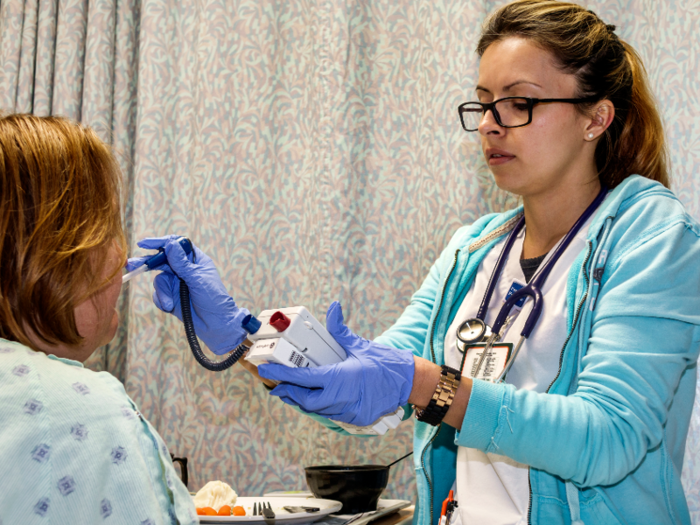
Full, reduced, or restricted practice: Restricted
Autonomous practice restriction: Nurse practitioners cannot independently diagnose and treat patients without physician involvement.
Primary care provider: State statute does not define whether nurse practitioners can be primary care providers.
Ability to prescribe medication: Nurse practitioners in Florida may only prescribe certain drugs as specified in a protocol.
Additional sources: MidlevelU

Full, reduced, or restricted practice: Restricted
Autonomous practice restriction: Nurse practitioners cannot independently diagnose and treat patients without physician involvement.
Primary care provider: State statute does not define whether nurse practitioners can be primary care providers.
Ability to prescribe medication: Nurse practitioners in Georgia may only prescribe based on the specialty of their collaborating physician and the Georgia Composite Medical Board's authority.
Additional sources: Valdosta Daily Times

Full, reduced, or restricted practice: Restricted
Autonomous practice restriction: Nurse practitioners cannot independently diagnose and treat patients without physician involvement.
Primary care provider: State statute does recognize that nurses can act as primary care providers.
Ability to prescribe medication: Nurse practitioners may prescribe a limited amount of drugs with pre-authorization.
Additional sources: Tennessean

Full, reduced, or restricted practice: Restricted
Autonomous practice restriction: Nurse practitioners cannot independently diagnose and treat patients without physician involvement.
Primary care provider: State statute does recognize that nurses can act as primary care providers.
Ability to prescribe medication: Nurse practitioners may prescribe certain drugs after completing an educational requirement in advanced pharmacotherapeutics.
Additional sources: Nurse.org

Full, reduced, or restricted practice: Restricted
Autonomous practice restriction: Nurse practitioners cannot independently diagnose and treat patients without physician involvement.
Primary care provider: State statute does not define whether nurse practitioners can be primary care providers.
Ability to prescribe medication: Depending on their education and certification, nurse practitioners may prescribe limited amounts of legend drugs and controlled substances.
Additional sources: North Carolina General Assembly

Full, reduced, or restricted practice: Restricted
Autonomous practice restriction: Nurse practitioners cannot independently diagnose and treat patients without physician involvement.
Primary care provider: State statute does not explicitly recognize nurse practitioners as primary care providers.
Ability to prescribe medication: Nurse practitioners can prescribe certain drugs under the authority of their collaborating physician and may only prescribe a limited amount of opioids in hospitals.
Additional sources: Scope of Practice Policy

Full, reduced, or restricted practice: Restricted
Autonomous practice restriction: Nurse practitioners cannot independently diagnose and treat patients without physician involvement.
Primary care provider: State statute does not define whether nurse practitioners can be primary care providers.
Ability to prescribe medication: Nurse practitioners in Missouri are only authorized to prescribe hydrocodone combination products.
Additional sources: Missouri Senate

Full, reduced, or restricted practice: Restricted
Autonomous practice restriction: Nurse practitioners cannot independently diagnose and treat patients without physician involvement.
Primary care provider: State statute does not define whether nurse practitioners can be primary care providers.
Ability to prescribe medication: Nurse practitioners can't prescribe opiates and other drugs unless they complete an educational requirement in pharmacology or pharmacotherapeutics and tell the patient they're a nurse practitioner.
Additional sources: WHSV

Full, reduced, or restricted practice: Restricted
Autonomous practice restriction: Nurse practitioners cannot independently diagnose and treat patients without physician involvement.
Primary care provider: State statute does not define whether nurse practitioners can be primary care providers.
Ability to prescribe medication: Nurse practitioners may prescribe certain drugs as long as they sign the prescription and provide their prescriptive authority number, the location of their practice, and the collaborating physician's information.
Additional sources: The Post and Courier

Full, reduced, or restricted practice: Reduced
Autonomous practice restriction: Nurse practitioners cannot independently diagnose and treat patients without physician involvement.
Primary care provider: State law implies, but does not explicitly state, that nurse practitioners can be listed as a primary care provider, according to MidlevelU.
Ability to prescribe medication: Nurse practitioners cannot prescribe opiates and other drugs used to treat chronic pain, intractable pain, or obesity.
Additional sources: MidlevelU.com
 “Wish to follow in the footsteps of PM Modi!” ‘Anupamaa’ star Rupali Ganguly joins BJP
“Wish to follow in the footsteps of PM Modi!” ‘Anupamaa’ star Rupali Ganguly joins BJP
 “Wish to follow in the footsteps of PM Modi!” ‘Anupamaa’ star Rupali Ganguly joins BJP
“Wish to follow in the footsteps of PM Modi!” ‘Anupamaa’ star Rupali Ganguly joins BJP
 Assassin’s Creed Mirage on iPhone 15: Killer game to debut on Pro and iPad on June 6
Assassin’s Creed Mirage on iPhone 15: Killer game to debut on Pro and iPad on June 6

Copyright © 2024. Times Internet Limited. All rights reserved.For reprint rights. Times Syndication Service.